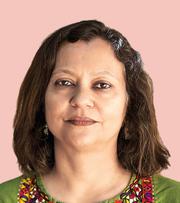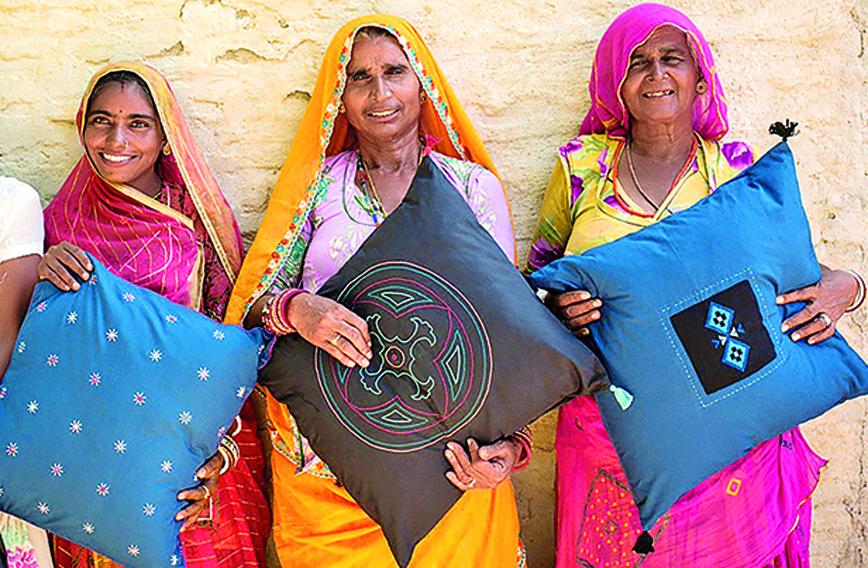
SUMITA GHOSE
STARTING an independent for-profit social enterprise in rural India is not just a venture — it’s a courageous step towards bringing about meaningful social change, reducing inequality, and ensuring inclusive development and growth. Inclusion of rural women with their innate intelligence, knowledge and wisdom is key to building resilient creative enterprises in the handloom and handicraft sector. Inspired by the legacy of visionaries like Rabindranath Tagore, Mahatma Gandhi, and Kamaladevi Chattopadhyay, many brave souls have embarked on this journey, driven by a vision of a better future.
Yet, venturing into this realm requires more than just vision — it demands unwavering commitment and action, walking the talk, and being the change you wish to see. One cannot tread this path alone. Collaboration with like-minded individuals who share the same vision is paramount, and collective action needs to be based on mutual trust.
The first hurdle arises in raising funds. Traditional banks may hesitate to lend, and angel investors seek commitment from promoters. Asking economically disadvantaged individuals to invest when they have little to spare requires trust, vision, and readiness for a long-haul journey. And thinking out of the box!
I recall a meeting with rural women in Dheerdan village of Loonkaransar block in Bikaner, way back in the early 1990s. Twenty-five of the poorest women in the village had to decide who among them would be entitled to loans for the coming sowing season — the kharif crops of bajra, moth and gawar. The previous year had been a drought year, and the women farmers had no seed left over for sowing. The women had been saving very small amounts each month, as part of their Self-Help Group (SHG). This savings was to be matched by funds given by the URMUL Trust, the local voluntary organization. Almost all families owned land, but this land yielded little due to scarce rainfall in the desert.
Despite the obvious risks, everyone put in their faith and their hard work to plough and till the land, in the hope of a decent harvest year after year. This year was no different.
But resources were scarce and the women had to choose 20 from amongst themselves who would receive the loan. The decision was made without too much disagreement, as the women knew who were the most needy amongst them. Lacha Bai was one of the lucky recipients, but to everyone’s surprise she declined the loan. Her hesitation was due to the uncertainty of the monsoons, and her ability to repay the loan. She had recently lost her husband and had four young children to raise.
The women rallied around her — offering to donate part of their seeds (the ‘in kind’ loan they would receive) to her so that she had seeds to plant. And one woman whose family owned a camel offered it to her for ploughing the land. Their solution? If the rains were good and she got a good harvest she would return the seed loan given to her; if the harvest was poor, she could consider the seeds as a gift! It was a simple solution, based on mutual trust and understanding, and it is doubtful whether any bank would come up with this solution. Farm loan waivers are rarely granted and if declared are around election time!
The strength of a collective enterprise is in its numbers, and putting in whatever resources and skills entrepreneurs have to start up and get going. Rangsutra too began in a similar way with 1,000 artisans, 800 of them women, putting in Rs 1,000 each, in 2006 — taking the first step in co-creating a company to craft their own enterprise.
Along with raising funds, building relationships is key — not just transactional exchanges, but genuine, long-term partnerships with one another, with funders, with suppliers and buyers.
Despite the efforts of social entrepreneurs and the noble intentions of the government and private sector, numerous gaps in the ecosystem hinder rural social enterprises’ growth:
Despite government schemes, obtaining adequate financing remains a challenge due to perceived risks and bureaucratic hurdles. These are the gaps that exist:
Capacity building support:
Existing programmes often fail to meet the specific needs of social enterprises which require tailored training and mentorship. There are initiatives by the private sector in mentorship and training, but these cater mostly to the English-speaking entrepreneur.
Rural infrastructure:
Safe, secure workspaces in villages are rare, hindering productivity and artisan growth. Collaborative efforts, like village craft production centres, built by the government, and the community are possible, but require agency and advocacy by village women.
Limited market access:
Social enterprises struggle to access markets, especially marginalized or remote communities, hampering growth opportunities. Very few social enterprises have deep pockets to compete with the high marketing budgets that large companies have. Additionally, handcrafted products struggle to compete with machine- made copies of virtually all our traditional craft techniques.
Regulatory hurdles:
Complex registration processes and bureaucratic red tape hinder progress, necessitating streamlined regulations. Some progress has been made here to enable women’s SHGs to conduct businesses, but these are not sufficient and most producer-owned companies struggle with legal compliances.
Fragmented ecosystem:
Lack of coordination among stakeholders results in duplicated efforts, undermining overall effectiveness.
Limited awareness and recognition:
Social entrepreneurship remains misunderstood, necessitating concerted efforts to raise awareness among the public and policymakers.
Infrastructure and technology gaps:
Many rural enterprises lack essential infrastructure and technology, impeding scalability and innovation.
Addressing these gaps demands collaborative efforts by government, civil society, and the private sector. Each of us can contribute by making conscious consumer choices, supporting hand-crafted products made creatively, ethically, sustainably, and under fair working conditions. Your purchase has a voice in shaping a better tomorrow.
Sumita Ghose is founder-director of Rangsutra Crafts
Comments
Currently there are no Comments. Be first to write a comment!




